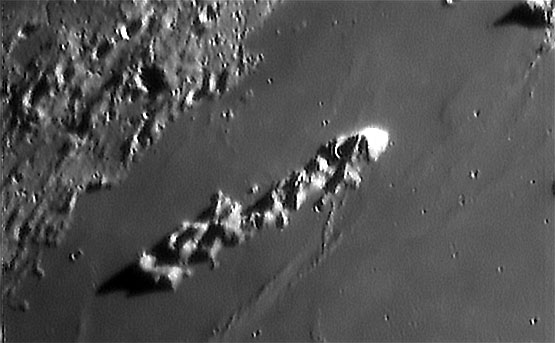August 8, 2015
Straight Range
Originally published August 7, 2004
Image Credit: Wes Higgins |
|
Straight Range Goggle "Straight Range" or "Montes Recti" and all you get are links to amateur images and nomenclature lists that include the name. What is there to say about this mountain chain in northern Mare Imbrium? Well, its about 80 km long and, according to one old shadow length measurement, the eastern end rises 2 km above the mare surface. And that's it. But if you can pull back your gaze to include all of Imbrium, you may notice that the Straight Range is just one of several peaks along the periphery of Imbrium. In 1962, Bill Hartmann and Gerard Kuiper noticed that if you look at Imbrium from overhead, correcting the foreshortened view we get from Earth, the Straight Range and many of the peaks define a circle 670 km in diameter and concentric with a larger circle defined by the Apennine and Carpatian mountain rims. Thus, the Straight Range and the other isolated peaks are the high points of an inner basin ring, as is seen clearly at the Orientale basin. The inner ring at Imbrium is marked by the Straight Range, the western Teneriffe Mts, Pico, Spitzbergen, and some peaks near Archimedes, Lambert and Caroline Herschel. In fact, Prom. Laplace also falls on this circle. And notice the close association with mare ridges too. Basin inner rings are the transmogrified version of central peaks in normal impact craters. In other words, some sort of rebound phenomena from the basin-forming impact. Inner rings are also seen in basins on Mars, Mercury and Venus, as well as the Moon. Technical Details: Related Links: Yesterday's LPOD: Moon Resort Tomorrow's LPOD: NE Backwater |
Author & Editor: |
COMMENTS?
Register, Log in, and join in the comments.




